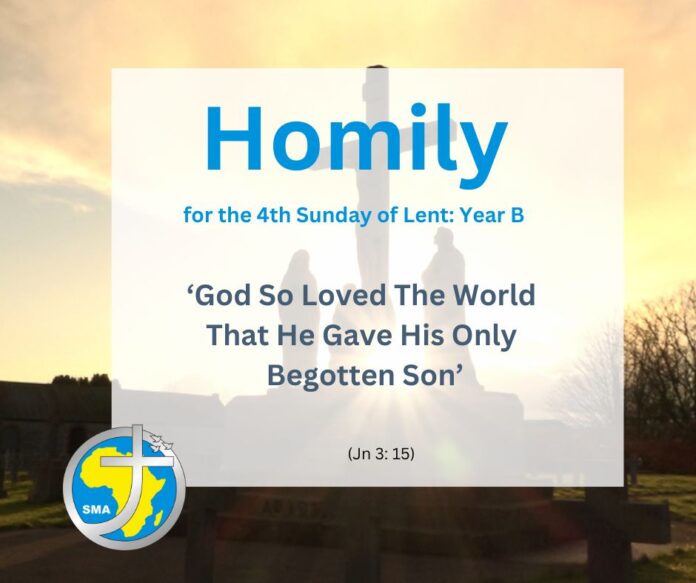2 Chronicles 36:14-16,19-21 – Ephesians 2:4-10 – John 3:14-21
Two of the most beautiful, heart-warming and challenging statements in the Bible are found in the passages chosen for today’s Eucharist: ‘God loved the world so much that he gave his only Son so that everyone who believes in him may not be lost but may have eternal life (Jn 3: 15); and ‘We are God’s work of art’ (Eph 2:10). These statements are intimately connected to one another and the connection is Love. God loved the world so much because, as John tells us in his first Letter, ‘God is Love’ – Love at the heart of the world since the dawn of creation. And Jesus is Love Incarnate. Hence we, who are created in the image of the God of Love cannot but be ‘God’s work of art’. What a different world it would be if we all believed those statements and took them to heart.
The problem is that we don’t really believe that God loves us or that we are his work of art – works of art in which he delights. One of the tragic consequences of sin is that we remake the God of Love into a projection of our guilt. As the Dominican theologian, Herbert Mc Cabe, states: ‘Blinded by our guilt, we don’t see the real God at all; all we see is some kind of judge who condemns us’. Jesuit priest, Fr Gerard Hughes, makes the same point in his spiritual classic, The God of Surprises. Many people, he writes, are burdened with an inadequate image of God as a stern judge, not averse to using threats to get his way – a God who warns us to be good or else face rather drastic consequences. One of the consequences of this distorted image of God is that we hide away from the God we have grown to fear. We turn away from the light and take refuge in darkness. The great philosopher, Plato, wrote: ‘We can easily forgive a child who is afraid of the dark; the real tragedy of life is when adults are afraid of the light’.
Nicodemus was a Pharisee and a member of the Sanhedrin, the supreme religious court in Israel. He was also an open-minded man and a seeker of truth. However he, too, was afraid of the light. That was why he came to Jesus at night-time. Nevertheless, Jesus made time for him and tried to open his heart to the God who loved him so much that he could make a new person out of him, and even enable him to be born again. This was too much for Nicodemus to take in. He had lived too long in semi-gloom of a tradition, hide-bound by a myriad of legal prescriptions to be able to take that leap of faith into the light Jesus is proposing to him. However, Nicodemus did not break off all contact with Jesus and he eventually came to see the light and accept the message of Jesus.
There is a lot of Nicodemus in most of us. We are attracted to Jesus and his message about God’s love but hesitant to open our hearts fully to its transforming force. And we find the idea that we might be God’s work of art at least as frightening as it is consoling. As the American author, Marianne Williamson, states: ‘It is our light, not our darkness that most frightens us. We ask ourselves, “Who am I to be brilliant, gorgeous, talented, fabulous?” Actually, who are you not to be? You are a child of God. Your playing small does not serve the world. There is nothing enlightened about shrinking so that other people won’t feel insecure around you. We are all meant to shine, as children do. We were born to make manifest the glory of God that is within us. It’s not just in some of us; it’s in everyone. And as we let our own light shine, we unconsciously give other people permission to do the same. As we are liberated from our own fear, our presence automatically liberates others.’
As he was with Nicodemus, Jesus is patient with us. He understands our fears and will help us to overcome them. If we keep returning to him, who is the incarnate God of Love we will overcome our fears, leave the dark behind and flourish in the sunshine of God’s loving and admiring smile. Let us not be afraid to trust Jesus to lead us out of darkness into the light and help us grow to our full stature and dignity as God’s works of art.
Michael McCabe SMA
Click on the play button below to listen to an alternative homily from Fr Tom Casey SMA.
|
|

